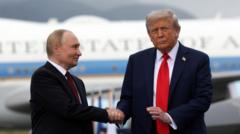Recent reports indicate a notable shift in the United States president’s approach to the ongoing conflict in Ukraine, a change that is poised to cause considerable unease in Kyiv and across Europe. Previously, the US leader had signaled that a cessation of hostilities would be a necessary precursor to any direct discussions with Russian President Vladimir Putin. This earlier stance implied a demand for a de-escalation of fighting before high-level diplomatic engagement.
However, the latest developments suggest a departure from this prerequisite. This revised position is viewed as directly conflicting with the strategic objectives and preferred timeline held by Ukraine and its key European allies. For Ukraine, any move that appears to endorse a premature ceasefire without significant territorial gains is seen as potentially cementing current battle lines and legitimizing Russian occupation, rather than pursuing a full restoration of its sovereign territory.
Similarly, European nations, which have largely stood united in their comprehensive support for Ukraine’s defense and territorial integrity, are expected to view this policy pivot with deep concern. Their collective efforts have been focused on sustaining military aid and sanctions pressure to empower Ukraine to reclaim its land. A shift in the US position could undermine this unified front, potentially weakening their negotiating leverage and raising questions about the long-term commitment to Ukraine’s complete sovereignty. The anticipated reaction across these allied capitals is one of disappointment and strategic re-evaluation.



